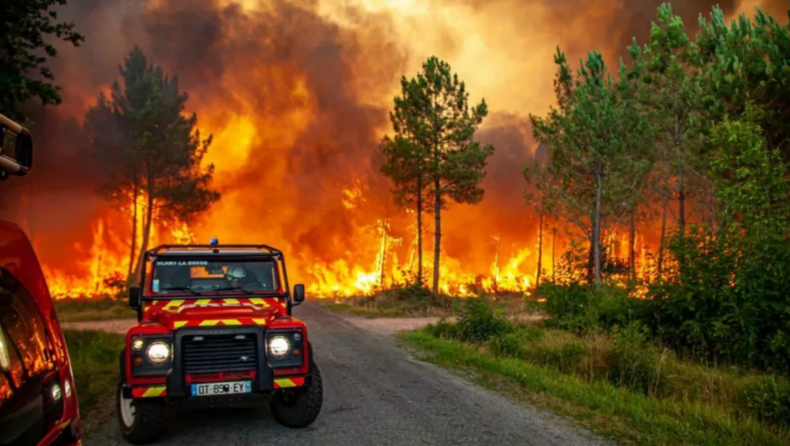Increasing temperatures cause plants to lose moisture, producing an excess of dry fuel. When a fire starts racing through a region of forest, drought and extreme heat can destroy plants, dry off dead grass, and dry other forest floor materials. And these wildfires changing Europe`s climate.
Intense wildfires are raging across Europe, and nations like Spain, Greece, and France are scrambling to put out the fires and control the damage.
A blazing heatwave has pushed hundreds of people from their homes, and thousands of hectares of forest land have burned to the ground.
Why are wildfires becoming more severe?
The proper climatic conditions, fuel that can burn, and a spark are necessary for wildfires. Plants lose moisture as a result of rising temperatures, producing an excess of dry fuel. When a fire starts spreading through a region of forest, drought and extreme heat can kill plants, dry out dead grass, and destroy other materials that are on the forest floor. While dry vegetation is the combustible material used to start fires, the spark is occasionally brought on by lightning, sometimes by human error, and sometimes by the carelessness of the local populace.
The early start of the fire season in Europe is the result of an extremely dry and hot spring that dried out the soil. Authorities blame climate change for this. They continue by saying that drought conditions in some areas and severe temperatures that are occurring earlier than typical are stoking the fires.
Experts on wildfires concur, noting that the dryness, extreme heat, and early fire season are all distinctly climatic change indicators.
How much of a hit has Europe taken?
PORTUGAL- Recently, temperatures in Portugal reached 47 degrees Celsius. According to the nation’s meteorological authority, there won’t be any relief for the following week.
Five forest and rural fires in the north and center of the country, the largest of which is close to the city of Chaves in the north, have proved difficult to put out by firefighters.
Late on Saturday, the Portuguese Ministry of Health reported that 659 persons, mostly elderly, had passed away as a result of the heatwave in the previous seven days. According to the report, Thursday saw a weekly high of 440 deaths.
At the end of June, 96% of mainland Portugal’s land area was already experiencing severe or exceptional drought. This situation persisted even after the recent heatwave.
SPAIN- Over 30 fires devouring woods across Spain are being fought by firemen with assistance from the emergency brigades of the nation’s military services.
The majority of Spain’s fire-fighting aircraft, according to the National Defense Department, have been put to use. There are several places with rocky, hilly terrain that are challenging for ground troops to access. There has been a heatwave in Spain for almost a week, with highs of 47.7 degrees Celsius. The heatwave would stop on Monday, according to Spain’s national weather service, but cautioned that temperatures would continue to be “abnormally high.”.
FRANCE-Regional officials in France reported on Sunday that more than 14000 people have been evacuated as wildfires in the Gironde area of the country’s southwest have now grown to cover 11,000 hectares (27 000 acres). Efforts to put out the fires are currently being made by more than 1200 firefighters.
Emergency and Civil Protection Authority Commander Ande Fernandes urged people to take care not to ignite new fires in such bone-dry conditions.
GREECE-On Saturday, the local fire department reported that 71 fires had started in the previous day. In Rethymno on the island of Crete, where the fire has been raging since Friday, more than 150 firefighters were battling it on Sunday. Strong winds blew gasoline into the flames.
How risky is breathing in smoke from wildfires?
Wildfire smoke, and notably the concentration of PM 2.5, can have an adverse effect on the respiratory and cardiovascular systems in addition to directly endangering people’s lives and property. There’s a chance of flare-ups for people who already have heart or lung disease.
Methods for handling it
The size and frequency of wildfires are also increasing. According to experts, the strategy must switch from battling fires to mitigating the causes of catastrophic fire outbreaks.
By creating the proper awareness sessions to public on this issue and also trained well our forces to handle it with better equipment’s.













